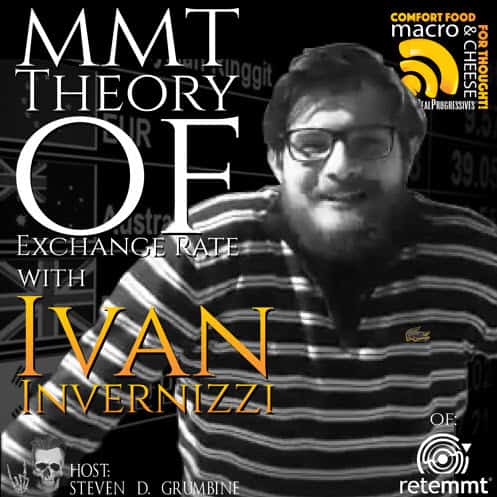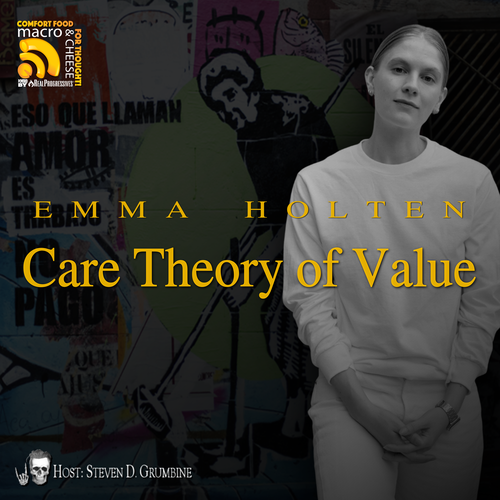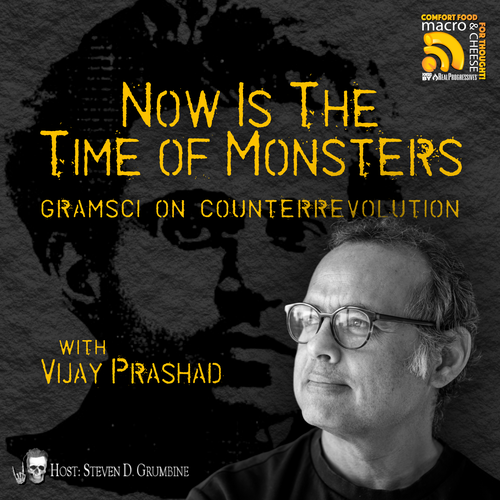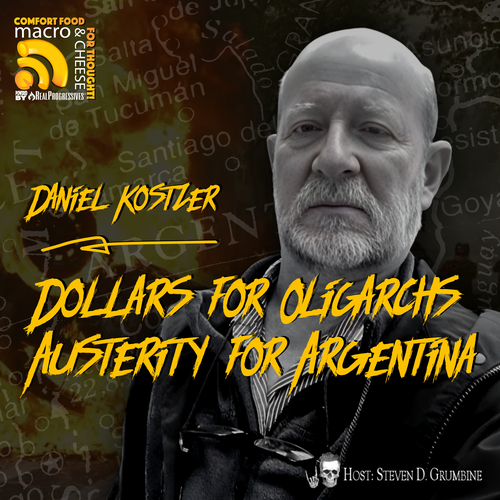Episode 15 – MMT Theory of Exchange Rate with Ivan Invernizzi

FOLLOW THE SHOW
Is a dollar worth more in DC or NYC than in Idaho? Yes, it is. Guest Ivan Invernizzi, of ReteMMT Italia, focuses the MMT lens on exchange rates, showing how this is yet another way that workers get screwed, simply because of their employer’s distance from the central bank.
Steve’s guest, Ivan Invernizzi, co-founder of Rete MMT in Italy, explains that currency has an “exchange rate” within a nation’s borders. In fact it has several, because there are different levels of discrimination in access to currency. With geographical and class differences, the balance of power shifts because of the way the state organizes banking, and who the state supplies with currency.
The corporations and individuals who receive payments directly from the government are in a stronger position than those a few rungs down. Ivan refers to this as filtering; we call it subcontracting. The farther from the currency issuer, the weaker the economic position. This is true of both employer and worker. A job guarantee would eliminate the filter, putting workers on equal footing.
Ivan widens the discussion to include the role of foreign exchange. Does trade determine the exchange rate or is the state still in control? Ivan Invernizzi is co-founder of ReteMMT Italia and MMT France. He is working toward his MS in Economics and Global Markets at the University of Bergamo, Italy
Macro N Cheese – Episode 15
MMT Theory of Exchange Rate with Ivan Invernizzi
May 11, 2019
Ivan Invernizzi [intro/music] (00:02):
If you have an employer of last resort, a job guarantee, a transitional job program, you’re providing to everybody a universal, direct access to currency. The state needs to go spend first where there is more unemployment, where there is less population density. You don’t have to care about trade imbalances or the exchange rate itself because the trade imbalances are more a result than a cause of the exchange rate.
Geoff Ginter [intro/music] (01:28):
Now let’s see if we can avoid the apocalypse altogether. Here’s another episode of Macro N Cheese with your host, Steve Grumbine.
Steve Grumbine (01:34):
All right. I want to thank Ivan Invernizzi of the Rete MMT from Italy, joining us today at Macro N Cheese. Today this interview, this discussion is kind of a continuation of our first meeting at the World Modern Monetary Theory Conference in New York City. I got to first meet Ivan at the conference, and we talked about his paper.
And his paper, which we’re going to be discussing today is called MMT Theory of Exchange Rates. Now, for those of you in the United States that listen to Macro N Cheese, you’ll know that many people out there talk about “Well, MMT is good for a closed economy and only for domestic markets.” And a lot of times they’ll dismiss the concept that MMT even talks about exchange rates or talks about any of the external constraints as a whole.
Ivan has taken an academic deep dive into this subject, and I found it fascinating. So, what I’m going to do before we get too far into this is allow our friend Ivan to introduce himself so we can give a proper explanation of who this young man is. And then we’re going to go into an explanation of what this paper is all about. So, Ivan, tell us a little bit about yourself.
Invernizzi (02:55):
Hi sure. Thank you for having me. And it’s very, it’s really a pleasure for me to be here with you now. So I’m a co-founder of Rete MMT, which is an association that is spreading MMT into the Italian society in several environments – academic, business association, union, cultural, environment, and of course on the net. And through the years, somehow help the development and create a connection with Spain.
In fact, we have our, now we are cousin in Spain, which are called Rete MMT Espana. Rete means network. Rete means network Italian. And now currently I’m actually trying to develop MMT also in France with the help of Robert Cauneau who is a French accountant, retired. So I have a bachelor in political economics, finishing my master of science, political economics at University of Bergamo, and I did organize for several years, many meetings and activities related with MMT. This is me basically.
Grumbine (04:16):
And a beautiful me this is. So, I want to also say, I’ve never met a more kind gentleman in my entire life. And I promise you. You know, when I first met you and Daniela and Gian Luca, I was so impressed with just the graciousness that you all have. And it made me feel a kinship with you that has just not left me. So I’m really grateful for you to take the time to talk today.
So let’s go into your paper. The three things that grabbed me right off the bat are number one, you talk about the access to currency at a local level within a currency issuing nation. Then you talk about the monopoly power of the currency issuing entity. And then you talk about the exchange rates and the theory of exchange rates beyond the domestic borders of a currency issuing nation.
So why don’t we start with the first part, which is the overview of your paper. And then we’ll take a stab at each one of these three concepts to finish off the program.
Invernizzi (05:22):
Sure. Basically, I start from the real nucleus of MMT that recognizes the currency as a public monopoly, which is imposed on a territory by the taxation. So you have a state that imposes taxes to a set of economic agents. Those taxes create the need in those economic agents to provide themselves with the currency.
And therefore the taxation creates a supply on the territory of goods and services in exchange for the currency of the state. And this is the nucleus of MMT, the starting point. Of course, then you have the state that can spend, can create by spending its currency and provide itself real resources by the private sector. The point is that the state usually taxes a larger population than the one which it provides directly with this currency.
So you have people who are taxed in a currency, but they are not actually directly receiving the currency of the public spending directly from the state, actually they need to go find the currency from other products, other private agents. And this basically creates a generic system of arbitrage of currency within the private sector that we usually call the market.
So basically I see the market as an arbitrage of currency, and in such a way, I see a discrimination in the access to currency. And discrimination is, of course, made first of all on the same individual basis. There are those who have the possibility to have direct access to currency and those who don’t have it.
So, but then you have also geographical and let’s say class balance of power that can be shifted because of how the state organized spending to whom the state provides what they call the primary supply of the currency. So basically such discrimination creates what I call the currency filter, which is the combination of all the passages that the currency needs to do before it reaches a specific agent.
And of course there are implications in terms of evolution of the term of exchange of the currency within the private sector. Of course, being an arbitrage at the primary supply, the currency will have a value, a term of exchange for real goods and services, which is very likely to be lower than in the next passage.
And you can see the effect of that in prices. how come the prices in a very remote or very peripheral area are likely to be different, for instance, in the center of the capital of the country? One of the reasons is that the primary supply of the spending is likely to be more concentrated in the center of the capital than anywhere else. Yeah.
So this is basically the overview and another point, which is very important that is related with all the things I said is that since the currency is a public monopoly, the monopolist has a direct power in the determination of its value of its term of exchange is the state that decides what the private sector needs to do to add the primary supply to get its currency. And that’s something that in the post-Keynesian theory and approach is completely absent.
Grumbine (09:38):
So, okay, this is great overview because you talked about arbitrage and I think a lot of people probably wouldn’t know what that term means because it’s a word that’s really intended for people within the economic field. This is an extremely important word, and it captures an awful lot of stuff.
If you look at just the dictionary version of it, it says the simultaneous buying and selling of securities currency, or commodities in different markets or in derivative forms in order to take advantage of different prices for the same asset. So basically this is talking about trade and the exchange of not only currency, but goods and services. That is arbitrage, correct?
Invernizzi (10:21):
Yeah. Well, for arbitrage I mean a situation in which economic agents, buy something and then resell the same thing at higher price, at a higher term of exchange. It is the case of currency when you have, for instance, a corporation that received the currency directly from the state at that specific term of exchange, and then is able to resell this currency to buy other things, (for instance labour force) providing higher value to the currency.
How can it be? It can be because in case the subjects from which this corporation is buying the commodity doesn’t have the direct access to currency from the state. Let me make an example. So maybe it will be more clear. Make the case the state is building a new parliament, okay. And he’s hiring a big company for making this parliament and fine.
Then you have this corporation that is actually providing part of the job to another corporation. And then you have these other corporation, which is actually providing part of this job, let’s say, half of this job to another corporation. I don’t know is the word for these in English, but . . .
Grumbine (11:43):
I can tell you what the word for it in English is. This is called outsourcing – subcontracting. This is all the time where they’ll take a primary, they call it the prime. So you have a prime vendor that is contracted to do a major service. They will then in turn, send out what they call RFPs (Request for Proposal) or RFI (Request for Information) to find out who can compete to bid for the next pieces of those puzzles.
And what they’ll do is they’ll pick the low cost provider so they can keep making profit on all these different groups coming in to do this work. So that right there is a definite version or a definite great example of arbitrage. Now, it all makes sense to me. That’s Outsourcing 101. They do it the United States all the time. Yes.
Invernizzi (12:28):
And I think that people can intuitively understand that both the workers and the capitalists that are part of the first corporation who’s taking the first job from the state are in a different position than all the others. They are likely to have higher profit and higher salary. Then the last firm who was doing this job under a degree of outsourcing, why? Because the currency needs to go first from the first corporation, then to the second then to the third. So you have a filter over there.
You have a balance of power over there. And actually this is the market overall. Your overall market is like this. Why? Because the currency can come as net financial assets, can come from just the state and all we get it directly from the state, or we get from somebody who got it before us (and therefore that had to pay taxes with it before reselling it to other private agents) .
And so you, you have in the economy, all that kind of network and chain of passages of selling and buying currency for labor or commodity that incorporates labor, that reflect basically a balance of power. And to make it even more clear, if you are an employer of last resort, a job guarantee, a transitional job program, that is a very important MMT policy proposal.
You are changing this. You’re changing this because you are providing to everybody universally (meaning the workers of the country), a direct access to currency. So what I call the currency filter change its designed. And yes, I hope that was clear.
Intermission (14:32):
You are listening to Macro N Cheese, a podcast brought to you by Real Progressives, a nonprofit organization dedicated to teaching the masses about MMT or Modern Monetary Theory. Please help our efforts and become a monthly donor at PayPal or Patreon, like and follow our pages on Facebook and YouTube and follow us on Periscope, Twitter, and Instagram.
Grumbine (15:22):
So we talked previously about the inequality baked into that system. Obviously the people that get that first pass at this have a higher standard of living, have a higher benefit rate. For example, in the United States, it’s not uncommon for that first dollar to be spent into a major corporation that is obviously friends of people that are in Congress and so forth, a lot of corruption and so forth, but they have benefits.
They have healthcare, they have Cadillac plans there they’re able to do all these great things, but then the contractors that they hire, oftentimes don’t even have health benefits, have an hourly wage without any paid time off; they’re an at will employee, meaning that they could be fired at any time for any reason without cause.
And they have no protections whatsoever. So not only are they getting filtered through this currency filter you talk about, but they’re also being really, really stranglehold by the capitalist by the first pass corporation that gets that first access to the currency upon the first issuance. So there’s an incredible amount of inequality baked into this currency filter that I don’t think people fully realize.
I know that they understand something’s wrong, but the idea of how does this play in? How do we balance this? How do we bring about a more equal society? And I know that, you know, we’ve talked some about this, but what is your prescription? What is the MMT response to how to address this currency filter and this access to currency that is so unequal.
Invernizzi (17:07):
Yes. Let me answer the point that you raised first. So, the point is that once you have that some people need to get the currency from other privates and some others can receive it directly from its primary source (the State) a discrimination is taking place; a balance of power within the private sector emerges. One of the forms that the discrimination is taking is the one in which workers have the need to get the currency (necessarily) from capitalists.
In this case, it is a class struggle issue. But also in this case, the thing to understand is that this currency filter is important because you really understand the difference that the position of workers into the filter makes. You can understand, for instance, that the same very strong union organization inside a corporation it has more space for the improvement of workers’ condition the closer the corporation is to the state.
Because the more the corporation is closer to the state the more it is itself is in a privileged position; and therefore it can allow itself to give something to workers without going bankrupt. There is a space, let’s say, a space of contractual possibility, which is larger. the closer you are to the state.
Otherwise, if you are workers that are working for the outsourcing of the outsourcing firm, then the space that also the union, let’s say, the possibility of advances that also the union can try to reach – everything else being equal – are way more restricted. And this is also from a sociological and economical, political, industrial policy perspective — important, I think, to recognize.
Then of course, employer of last resort is the first thing that somehow provide a universal access to currency, at least to workers. And this already is an important step in favour of workers and, well, it would makes for sure the difference. Then on the other side, there would be an industrial policy design. They should take these into account.
So the state, I think, doesn’t need in its public spending to exacerbate concentration dynamics. Okay. So it doesn’t make any sense for me that the state goes increasing investment, increasing spending any which, of course, translate in employment in places where it’s already super crowded, you know, and leaving aside maybe the most rural area or the most area where basically there is lots of unemployment.
The state needs to go spend first where there is, let’s say, more unemployment; where there is less, let me say, let me say population density in some extent, then of course there are other variables that need to be taken into account, but you see if you are a city like Hong Kong or a city like London or Moscow, where all the spending is going from decade and there, I mean, the situation is becoming absurd. The price of housing is becoming crazy.
You have gentrification and you have basically a society, which is becoming more and more impossible. So my suggestion is to do not concentrate the public spending there, but try to dislocate a little bit. What is possible to dislocate in terms of, I don’t know, agency, in terms of investment for specific function that don’t have the need to be concentrated in the capital. Otherwise you will tend to have, let’s say, a society which is polarized between mega city and empty, forgotten territory.
Grumbine (21:14):
That sounds just like the United States right now. Just so you understand, in the US, as an example, we have this very big, big fight, and it largely translates ironically, directly into party lines of Democrat versus Republican, where you can see the major metropolitan areas of the United States are largely Democrat. And they are largely the heavy concentration of diverse populations, minorities, et cetera, large population centers.
And then the more rural areas are red state or Republican States. And these individuals, there’s a huge chasm of resentment, where as these rural States want to have a say in what’s going on. They feel like they’re completely dominated by these urban centers. And the urban centers are saying, Hey, we’ve got so many people here. We need to address these problems.
And because we have neglected both the rural areas, people try to, you know, they tend to forget that because of the many, many years of racism and so forth that we’ve had in this country, but there’s a real situation there where these individuals have been forgotten about, long since left behind. The austerity in the rural areas of America is an atrocity.
And it creates the environment that brings about someone like a Donald Trump, who in this country has been an embarrassment to us all. But the idea here is, is that when you look at the arbitrage and you look at the way that money is spent into the economy, these areas are largely forgotten and they have to drive 30, 40 miles just to go to see a doctor. It’s really, really rough.
And there’s no getting out of it because you don’t have any money to leave. So you’re stuck when they leave these islands of people that are desperate and destitute, and I think this is a really important point you raise. So thank you very much. Let’s go ahead and talk now about the exchange rate.
I know that you spent an incredible amount of time and effort working on the foreign exchange theory for MMT, and your understanding of its role with the external constraints, understanding the monopoly power of the currency issue in government. Can you tell us about your theory that you’ve developed or worked on and explain to us the relevancy for those people that are both learning MMT, but are also trying to get a better understanding of the world around us?
Invernizzi (23:56):
Sure. So basically the line of reasoning goes that the state with the primary supply, in other terms, the public spending, defines what the private sector needs to do to get currency directly from him (the state) in terms of abstract labor: what we call the term of exchange of the currency. Abstract labor is a Marxian account set, which basically means time of labor at average intensity and prevalent technique – so basically time of labor.
And for example, if we think that the state would provide $10 for one hour of labor on average, directly for labor, or for any commodity, that incorporates one hour of labor in another country, let’s say, Japan actually is doing double. So it’s saying, what the Japanese state will do, is providing 20 yen for one hour of labor, or for a commodity that embodies one hour of labor.
Then the intuition (thinking) is that everything has been equal, the structural exchange rate would gravitate around the $1 will be two yen. That will be one to $1 for 2 yen, one to two. . . . . Then, of course, there are many other elements that are needed to be taken into account – credit dynamics, real economic dynamics.
You know, the various levels of monopoly powers present in the market distort this structural term of exchange, as well as a shifting technology in one place or the other; but recognize that structurally there is something which is set by the state, and then there could be dynamics, which are built on that. Okay. One of those dynamics is also how harsh, let’s say, the discrimination of the currency filter is.
Because if you are a country that has, for example, an employer of last resort, or has a state that is not perpetuating lots of discrimination in the access of currency, the impact of the currency filter on the exchange rate is much different than in the case of a state where discrimination is very, very high. Why?
Because in the country where there is lots of discrimination, the access of currency, there will be an increase, a very big increase, revealing the domestic, local, the private sector in the currency value (the term of exchange of the currency). So why is it important to understand that at the end of the day? Is it important to understand that?
So there is a constraint that is set by the state on the value of the currency, the value of the currency, both in terms of real resources, in terms of abstract labor. And in terms of other currency, it’s not random and it’s not driven by the import – export. You know, it’s not the trade imbalances which are driving the exchange rate. There is something a priori of that.
In other terms, trade imbalances are reflecting the foreign net desire to save our currency at the current term of exchange, which is set domestically. And why is it so? Because the currency is created by the state. We have a term of exchange. So the term of exchange doesn’t emerge a posteriori. Money is actually first introduced into the system with a term of exchange (that expresses itself in the term of exchange rate).
But who cares about the term of exchange that a state is providing? Well, look, the point is that the state is able with the system that we know taxation and spending to set at least at the primary supply, how much work a currency buys – how much work, work time (how much abstract labor to be more rigorous).
And work time, which is labor force, actually are essential input for any production. So once your currency buys labor, it has value for everybody. It’s commensurable for everybody. But that’s why there’s no point. I mean, it’s not about if foreign agents will be interested or not in our currency. It is about at which term of exchange.
And of course the term of exchange would be compared with how much labor foreign currency is able to buy. (In other terms, the exchange rate is mainly an expression of the term of exchange determined by the state.) So this is basically my paper. And the conclusion is that you don’t have to care about trade imbalances, or the exchange rate itself, because the trade imbalance is more a result than a cause of the exchange rate.
And it’s very important to say this and now I’m finishing. But because in my experience in Italy, in Spain, in the academics, outside the academics at one point say the most pernicious concept that emerges is the foreign constraint. And MMT doesn’t say that there is no foreign constraint at all. The foreign constraint, of course, could be there also in a floating exchange rate system that is technological, is qualitative in nature.
Qualitative is not about currency. It’s not about exchange rate. It is different. It’s about what you are able to produce with your labor force; but there’s no constraint that prevents you to a full employment when you have a floating exchange rate system and you are in control of your currency. (The problem is what you are actually able to produce at full employment and NOT the ability to activate the labor force to reach full employment.)
Grumbine (30:10):
This is fantastic. So really to put a bow on it, many of the folks that follow us here at Real Progressives would say it is the real resources, once again, the ability to purchase goods and services with your currency, that is what really matters in the end. And it is definitely a function of the monopoly issuers value that they’ve placed on their own currency, because they are the price setter as Warren Mosler often says. Ivan, thank you so much.
This was incredibly enlightening to me. And hopefully everybody got to enjoy this. I can’t wait to see you again. Tell everyone over there within your team and so forth. The rest of the people that are with the Rete MMT community that we at Real Progressives and Macro N Cheese thank them for all the hard work they’re doing and you in particular, Ivan. Thank you so much for taking the time to be with us today.
Invernizzi (31:06):
It’s a pleasure to be here and I hope that we will continue to have collaboration like this one, because I see these exchanges have been very fruitful and very energizing from a moral and psychological standpoint for me.
Grumbine (31:25):
Absolutely. All right, well look, thank you so much. And with that, we’re going to close out. Everyone, please follow us on Macro N Cheese, Real Progressives. We look forward to hearing from you all in the future. Thank you so much. And of course, follow Ivan at Rete MMT, Italy, and with that, have a great day, everyone. Bye bye.
End credits [music] (31:50):
Macro N Cheese is produced by Andy Kennedy. Descriptive writing by Virginia Cotts and promotional artwork by Mindy Donham. Macro N Cheese is publicly funded by our Real Progressive Patreon account. If you would like to donate to Macro N Cheese, please visit https://www.patreon.com/realprogressives
Related Podcast Episodes
Related Articles

Terminator: No Fate But What We Make







